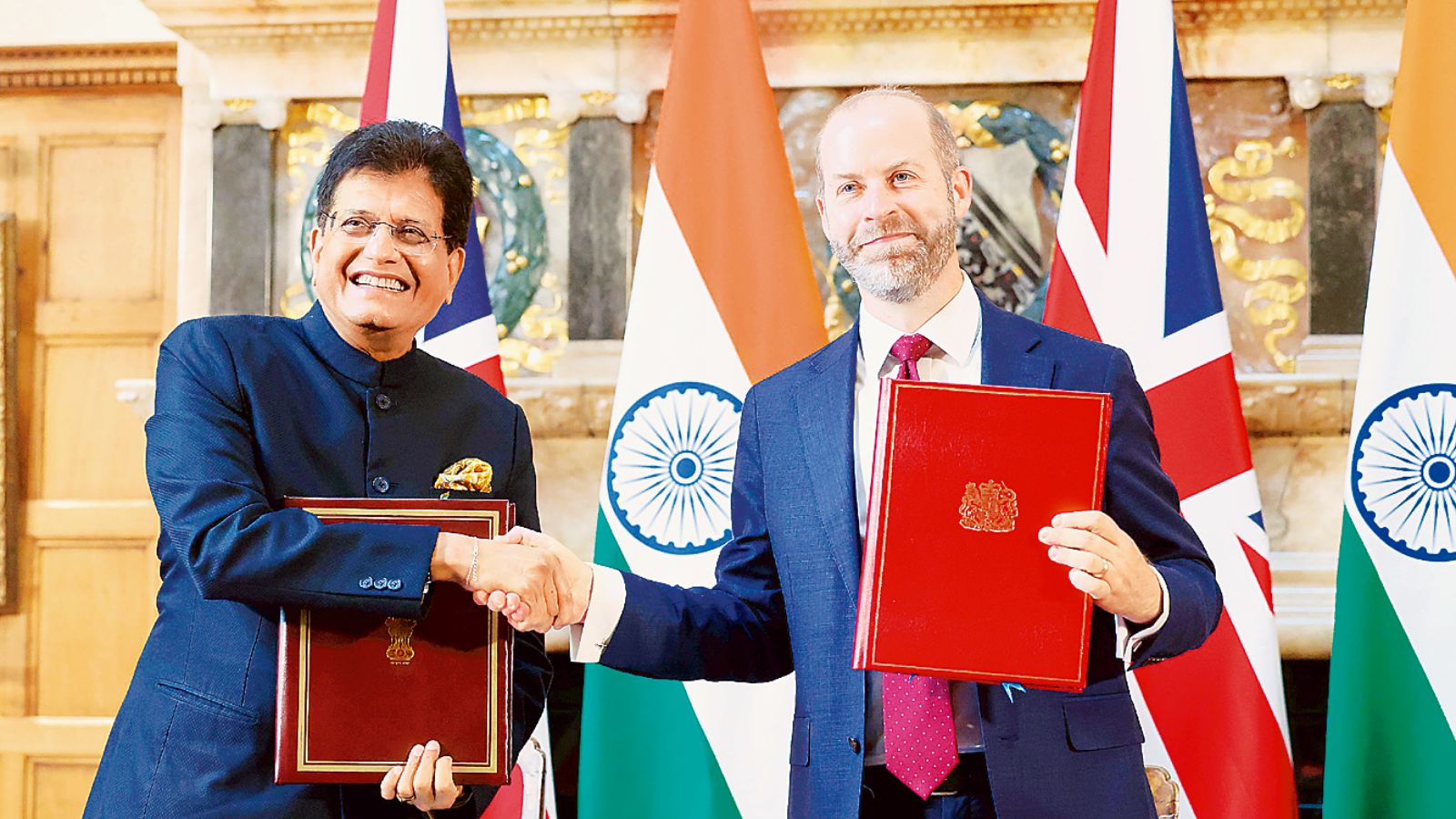
India not ‘tariff king’, says Commerce Secretary Sunil Barthwal
How did your country report this? Share your view in the comments.
Diverging Reports Breakdown
India not ‘tariff king’, says Commerce Secretary Sunil Barthwal
India’s average tariffs for the UK following the trade deal are set to drop to 3 per cent compared to the current levels of 15 per cent. Commerce Secretary Sunil Barthwal said that India can face competition and is not the ‘tariff king’ India has a trade surplus of around $6.6 billion with the UK, with exports of $19.8 billion and imports of $13.2 billion in FY25. The deal is expected to be ratified by the UK government within a year, as it must pass through both Houses of the British Parliament. “The UK market opens up duty-free for nearly all Indian agri-exports, with just a few limited exceptions like pork, chicken, eggs, rice, and sugar,” the Commerce and Industry Ministry said. The ministry said India has safeguarded its sensitive sectors — dairy, cereals and millets, pulses, and vegetables to high-value items like gold, jewellery, lab-grown diamonds, and certain essential oils.
Barthwal said at a press briefing that India and the UK have managed to strike the “right balance between strengths and sensitivities”, and that the government will begin capacity-building of exporters to make full use of the tariff concessions achieved in the UK trade deal. “FTAs are done, but the gains from the concessions can only come through stakeholder involvement. We have got concessions in textiles, leather footwear and processed footwear sectors, where tariffs were as high as 70 per cent. Now, the Commerce and Industry Ministry will begin capacity-building of our exporters,” Barthwal said.
Barthwal said that fears of dumping are unfounded, as the trade deal has rules of origin and product-specific rules in place to address such concerns, adding that the deal is expected to be ratified by the UK government within a year, as it must pass through both Houses of the British Parliament. “The regulatory ecosystem between the two countries will also be improved. In this FTA, there are timelines as to when the mutual recognition agreement is supposed to be completed. This will improve certainty for businesses operating in both countries,” Barthwal said.
Story continues below this ad
Sectoral gains & sensitivities
Government officials said that India’s major exports — from labour-intensive sectors like textiles, gems & jewellery, leather and footwear, machinery, pharmaceuticals, and processed foods — are set to gain a major edge with zero-duty access to the UK, improving the competitiveness of Indian goods in the UK market.
“The UK market opens up duty-free for nearly all Indian agri-exports, with just a few limited exceptions like pork, chicken, eggs, rice, and sugar. A golden opportunity for our farmers and agri-entrepreneurs to shine on a global stage,” the Commerce and Industry Ministry said.
Story continues below this ad
The ministry said India has safeguarded its sensitive sectors — dairy, cereals and millets, pulses, and vegetables to high-value items like gold, jewellery, lab-grown diamonds, and certain essential oils. “Strategic exclusions also cover critical energy fuels, marine vessels, worn clothing, and critical polymers and their monofilaments, smartphones, optical fibres — a strong stand to protect farmers, MSMEs, and national interests,” the ministry said.
Notably, India has opened 89.5 per cent of its tariff lines, covering 91 per cent of the UK’s exports, and only 24.5 per cent of the UK’s export value will enjoy immediate duty-free market access. “Strategically important products — particularly those where domestic capacity is being built under flagship initiatives like Make in India and PLI — will see concessions over periods of 5, 7, or even 10 years with gradual tariff reduction,” the ministry said.
Services sector gains
Joint Secretary in the Ministry of Commerce and Industry, Darpan Jain, said that the UK has offered its best FTA deal to India compared to all its trade partners in services adding that the UK has provided comprehensive and deep market access in 137 sub-sectors. India has a trade surplus of around $6.6 billion with the UK, with exports of $19.8 billion and imports of $13.2 billion in FY25.
Story continues below this ad
Jain said the UK’s commitments on mobility are comprehensive and the best in any FTA. “The UK has provided an assured mobility regime for various categories of natural persons: Business Visitors (BV) for all sectors — 90 days in any six-month period; Intra-Corporate Transferees (ICT) for all sectors including partner and dependent — three years.”
Govt procurement
The ministry said that the UK has accorded Indian suppliers a legal guarantee to participate in the UK procurement market — worth approximately $122 billion — for procurements conducted at the Central level of government and certain utilities. India, similarly, opens up a market opportunity of $114 billion. “For the first time, the UK agreed to take a binding commitment to provide non-discriminatory treatment to our suppliers under the UK’s Social Value regime. The UK’s threshold for goods and services is approximately Rs 1.6 crore; India’s threshold is approximately Rs 5.5 crore. For procurement related to construction services, both sides have agreed to a similar threshold of Rs 60 crore,” the ministry said.
A government official said that India has taken a complete carve-out for its MSME preferential procurement policy. “With respect to the Make in India policy, access to UK suppliers is restricted to eligibility to participate as deemed ‘Class-II local suppliers’ in domestic tenders above the agreed thresholds. Indian suppliers will continue to receive preferential treatment as ‘Class-I local suppliers’ in the UK,” the official explained.
